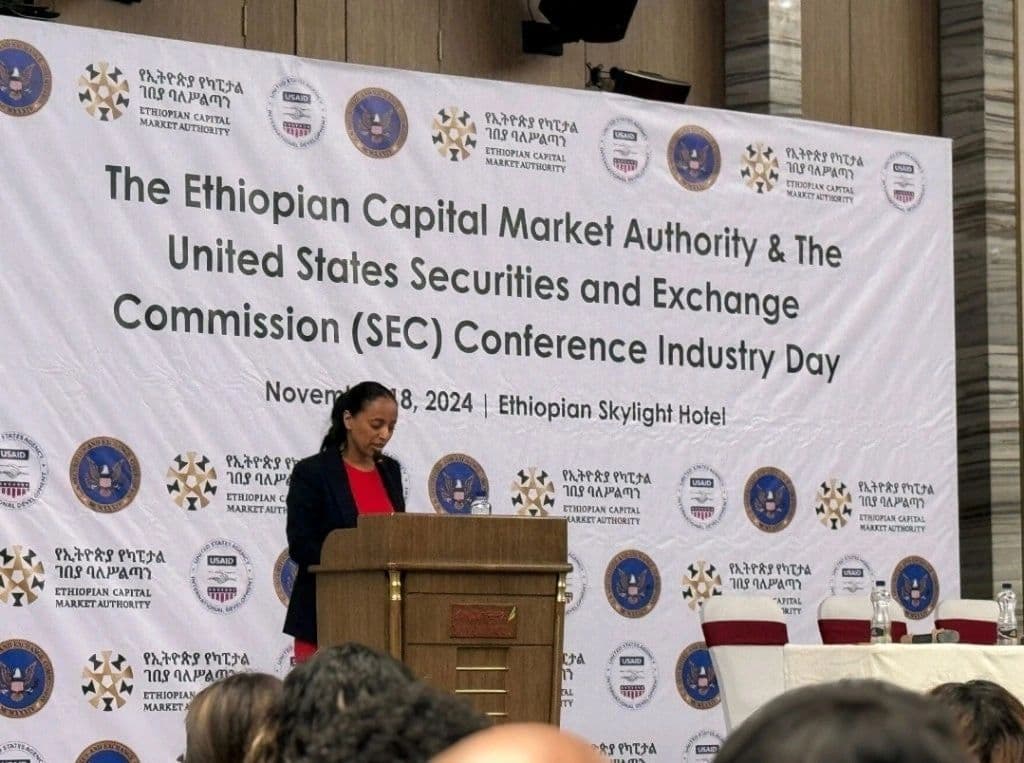Progress for 0 ad
Progress for 1 ad
Progress for 2 ad
Progress for 3 ad


Munir Shemsu
Addis Ababa, Ethiopia

As the Ethiopian Capital Markets Authority (ECMA) polishes the regulatory landscape in anticipation of the country’s maiden stock exchange, it has tapped support from regulators overseeing the biggest financial market in the world. Financial authorities from the United States Securities and Exchange Commission (SEC) were hosted by their local counterparts and the United States Agency for International Development (USAID) at the Skylight Hotel for a training program on Monday morning.
Glen Gordon, associate director at the SEC, provided insightful reflections on the balance between regulation and market development from a nearly three-decade career at the Commission. He highlighted the alignment of goals between the private sector and regulators in nurturing a market free of fraud and deceit.
“A basic set of good rules,” Glen noted as foundational to the development of functional markets.
He illustrated the potential for capital markets to outgrow the traditional banking system in providing access to capital, investment options, and economic prosperity. There were 653 unicorn startups with a combined value of 630 billion dollars that participated in the US capital markets in 2023. This figure starkly contrasts Ethiopia’s funding to startups, which was around 3 million dollars in the same year.
Furthermore, the total number of deposits in US banks equals nearly 23 trillion dollars while the size of the country’s fixed-income market alone includes more than 52 trillion dollars in outstanding debt securities.
Even with Ethiopia’s budding market just beginning to take its first steps, the need for a sound legal foundation to enable transparent and efficient markets is underscored by financial academic papers.
Glen stressed the importance of staving off ‘gotcha’ types of regulations by ensuring that enough information about the rules reaches at least compliance officers within market participants. He recommended maintaining a non-adversarial relationship with the industry to enable the identification of emerging trends and insights into crafting new regulations.
The associate director revealed that most SEC litigations end up in settlements in a bid to avoid lengthy trial procedures while minimizing the expenditure of the Commission’s resources.
“A good settlement is when both sides are unhappy,” Glen said.
The ability to compel the submission of documents and testimonies through subpoenas was also cited as a crucial component of enabling enforcement during the training. The SEC is also granted powers to demand telephone records, emails, and bank information from third parties.
Tilahun E. Kassahun, CEO of the Ethiopian Securities Exchange, acknowledged the importance of drawing insights from developed markets while noting the importance of developing tailored solutions.
“We won't directly copy everything,” he said.
Ethiopia’s first initial public offering occurred last month as the state-owned ethio tel issued 100 million shares to the public for a 10% stake. However, the public offering directive took effect just last week following its registration by the Justice Ministry.
Regulators from the SEC also stated the importance of ECMA officials remaining apolitical and maintaining the ability to litigate independently—uninfluenced by any part of the government.
👏
😂
❤️
😲
😠

Munir Shemsu
Munir S. Mohammed is a journalist, writer, and researcher based in Ethiopia. He has a background in Economics and his interest's span technology, education, finance, and capital markets. Munir is currently the Editor-in-Chief at Shega Media and a contributor to the Shega Insights team.
Your Email Address Will Not Be Published. Required Fields Are Marked *